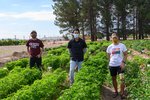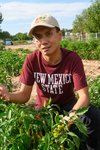Wind: mph,
Welcome to our new web site!
To give our readers a chance to experience all that our new website has to offer, we have made all content freely avaiable, through October 1, 2018.
During this time, print and digital subscribers will not need to log in to view our stories or e-editions.


As New Mexico chile producers braced for the summer harvest season, New Mexico State University welcomed a new chile pepper researcher into its fold.
Dennis Nicuh Lozada, an assistant professor in the Department of Plant and Environmental Sciences in the College of Agricultural, Consumer and Environmental Sciences, will lead the NMSU Chile Pepper Breeding and Genetics Program, housed at the Fabian Garcia Science Center in Las Cruces. He started his new role at NMSU on July 1.
Lozada’s appointment fills a position left vacated by the retirement of Paul Bosland, who co-founded the NMSU Chile Pepper Institute, a world-renowned research-based resource center for chile pepper information, in 1992.
“I am excited to be in this position. It’s an answered prayer for me,” said Lozada, who has a Ph.D. in cellular and molecular biology from the University of Arkansas and was a postdoctoral researcher at Washington State University before relocating to New Mexico. “I wanted to start a career that I think has a lot of significance and can impact the lives of many people.”
Lozada’s doctoral research involved implementing methods to accelerate plant breeding and genetics in winter wheat. He conducted part of his dissertation at the International Maize and Wheat Improvement Center in Mexico through a Monsanto Beachell-Borlaug fellowship.
But Lozada wanted to shift his focus from small grains to vegetables, he said, and that led him to NMSU, where he will oversee research initiatives at the Chile Pepper Breeding and Genetics Program, founded in 1888 by Fabian Garcia on the principal objective to improve chile pepper production through the development of genetically superior germplasm.
“My main goal is to integrate genomics and high-throughput phenotyping approaches to accelerate chile pepper breeding and genetics to develop varieties of chile peppers with improved yield, yield potential and quality” he said.
Lozada, who hails from the Philippines, said he aims to build on Bosland’s pioneering work.
“There’s a reason why he’s is known as the ‘Chileman’,” Lozada said, referring to Bosland. “He has done great work and established himself in the field of chile pepper breeding and genetics. I’m fortunate that the program is already very well established. We will capitalize on the excellent resources that we have.”
Although new to chile pepper research, Lozada recognizes that his work will play a critical role in the production of a crop that shapes New Mexico’s identity and economy.
In 2018, New Mexico increased its production of chile peppers to 71,100 tons – an estimated value of $53.8 million – from 62,200 tons in 2017, according to data from the U.S. Department of Agriculture. Overall, New Mexico ranked as the leading chile pepper producer in the U.S. in 2018, outproducing states like California and Arizona to earn the top spot by growing an estimated 53 percent of all chile crops in the country that year.
“A lot of people in New Mexico depend on chile peppers for their livelihood,” Lozada said. “That’s a major thing that we need to consider and why we need to develop better pepper varieties because a lot of people rely on this as a means of livelihood.”
Lozada said his research would also focus on disease resistance and climate adaptability.
“Many fast-spreading diseases pose risks to chile crops,” he said. “Likewise, hotter and more difficult-to-predict weather patterns can be just as determinantal to chile. We need to produce varieties that could withstand these conditions,” he added. “We also need to develop varieties that are more adapted to the changing climate and we can use genomics and phenomics approaches. We will be using different tools to achieve these goals.”
In addition to his research work, Lozada will also teach plant breeding and genetics courses to undergraduate and graduate students at NMSU, he said.
For more information about the NMSU Chile Pepper Breeding and Genetics Program, visit https://fabiangarciasc.nmsu.edu/chili-pepper-breeding-an.html.